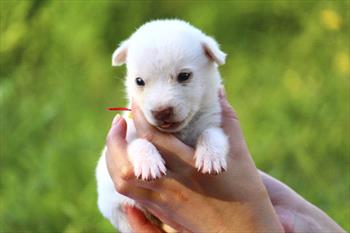Tiny puppy in woman hands

Photo courtesy of Depositphotos
Biting is a normal behavior in puppies. Just like human babies, they often explore everything with their mouths. Since they don’t have hands puppies frequently use their mouths as part of the normal play with other dogs and humans. Although normal, puppies have sharp teeth and their biting can be persistent. It is not uncommon for puppy owners to quickly become frustrated, damaging the relationship between humans and dogs.
To reduce these unwanted behaviors, you will need to prevent, manage, and modify your puppy’s environments to reduce opportunities for mouthing and biting.
Prevention
- Don’t rough house with your puppy.
- Don’t yell or shout at your puppy. This is likely to make the behavior worse. It also teaches your puppy that humans can be unpredictable and scary.
- Keep a log to identify when your puppy is most likely to frantically play, run, and “zoom” around the home because this is when play biting is likely to be most severe.
- Provide opportunities for downtime and independent play when the “zoomies” are most likely to occur. You can use an exercise pen or safe haven for short periods of confinement but make sure to provide your puppy with a long-lasting treat (like a frozen stuffed chew toy) when placing your dog in this space.
- Make sure your puppy’s basic needs are being met in terms of adequate exercise, positive reinforcement training, and interactive play time with you and other pets in the home.
- Teaching basic social skills such as eye contact, stationing on a mat, sit, and walking nicely on a leash can help build a repertoire of behaviors for reinforcement when needed.
Interrupt and Manage the Mouthing or Biting
- Freeze when your puppy jumps, mouths, or bites. Reward when they stay calm. This is important if children are the target for this behavior. Since excitement and these behaviors are often triggered by movement and high-pitched screaming, teach children how to freeze, cross their arms, and look down. You can tell children to stand still, like a tree, which can cause your puppy to lose interest, giving time for an adult to redirect them.
- Teach your puppy to target. This is a great alternative to biting and mouthing behavior.
- Keep a tug toy nearby and engage your puppy in a fun game.
- Change the environment. Clip on a leash and take your puppy for a walk or a game of fetch outside the home.
Modify Mouthing and Play Biting
- Capture behaviors that you would rather see from your puppy.
- Play the SMART x 50 game (from the book Plenty in Life is Free, by Kathy Sdao) with your puppy. Hold out 50 pieces of their kibble every day. Drop a piece of kibble with a “good dog” praise when you catch your puppy sitting, lying down on their mat, or any other behavior that you would rather see replace the biting and mouthing behavior.
- If your puppy is grabbing your pants while you move around, stand still. Once your puppy stops chasing you or mouthing you, mark the behavior with a clicker or “yes” and reward them with a treat.
- Teach your puppy to pick up and then drop items on cue to provide alternative behaviors to reinforce.
By adjusting your environment and your dog’s response, you can improve your bond with your dog.